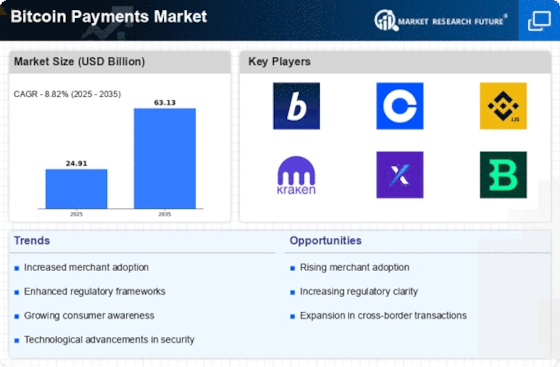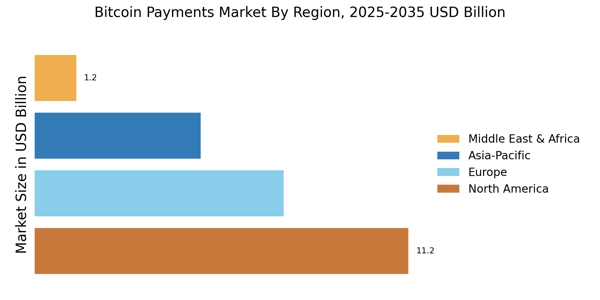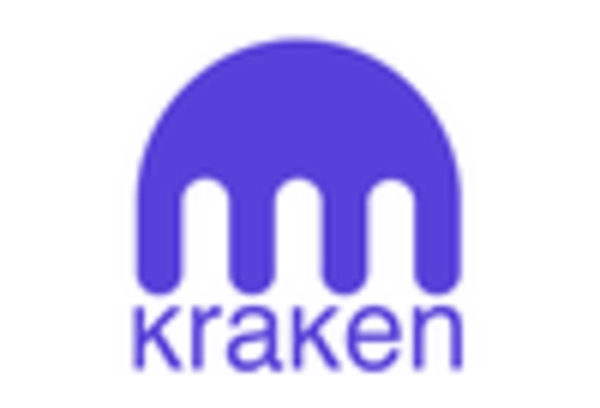Regulatory Clarity
The Bitcoin Payments Market is experiencing a shift towards regulatory clarity, which is essential for fostering a conducive environment for growth. Governments are increasingly recognizing the need to establish frameworks that govern cryptocurrency transactions, thereby reducing uncertainty for businesses and consumers. As of October 2025, several countries have implemented regulations that provide guidelines for Bitcoin payments, addressing issues such as taxation and anti-money laundering. This regulatory progress is likely to encourage more businesses to adopt Bitcoin as a payment method, as it mitigates risks associated with legal compliance. The establishment of clear regulations is expected to bolster consumer confidence, further propelling the Bitcoin Payments Market.
Institutional Investment
The Bitcoin Payments Market is witnessing a notable increase in institutional investment, which is reshaping the perception of Bitcoin as a legitimate payment method. Major financial institutions and corporations are beginning to allocate resources towards Bitcoin, viewing it as a hedge against inflation and a store of value. As of October 2025, institutional ownership of Bitcoin has reportedly risen to approximately 15% of the total supply, indicating a growing confidence in its long-term viability. This influx of institutional capital not only stabilizes the market but also encourages more businesses to accept Bitcoin payments, thereby expanding the Bitcoin Payments Market. The presence of institutional players is likely to enhance market credibility and attract further investment.
Growing E-commerce Sector
The Bitcoin Payments Market is benefiting from the rapid expansion of the e-commerce sector. As online shopping continues to gain traction, more businesses are exploring alternative payment methods to cater to diverse consumer preferences. In 2025, it is estimated that e-commerce sales will account for over 20% of total retail sales, prompting merchants to integrate Bitcoin payment options. This shift not only enhances customer experience but also allows businesses to tap into a broader audience, including tech-savvy consumers who prefer cryptocurrencies. The increasing acceptance of Bitcoin in e-commerce platforms is likely to drive further growth in the Bitcoin Payments Market, as it aligns with the evolving landscape of digital transactions.
Technological Advancements
The Bitcoin Payments Market is experiencing a surge in technological advancements that enhance transaction efficiency and security. Innovations such as the Lightning Network are enabling faster transactions, which is crucial for merchants seeking to adopt Bitcoin payments. As of October 2025, transaction speeds have reportedly improved by over 50% compared to previous years, making Bitcoin a more viable option for everyday transactions. Furthermore, advancements in blockchain technology are contributing to increased transparency and reduced fraud, which are essential for building trust among consumers and businesses alike. This technological evolution is likely to attract more participants to the Bitcoin Payments Market, as it addresses previous concerns regarding scalability and security.
Increased Financial Inclusion
The Bitcoin Payments Market is playing a pivotal role in promoting financial inclusion, particularly in regions with limited access to traditional banking services. Bitcoin offers an alternative payment solution for unbanked populations, enabling them to participate in the digital economy. As of October 2025, it is estimated that over 1.7 billion people remain unbanked, highlighting a significant opportunity for Bitcoin adoption. By providing a decentralized payment method, Bitcoin empowers individuals to conduct transactions without the need for intermediaries. This potential for financial inclusion is likely to drive demand for Bitcoin payments, as more individuals seek accessible and efficient financial solutions. The Bitcoin Payments Market stands to benefit from this trend, as it aligns with broader efforts to enhance economic participation.


















Leave a Comment